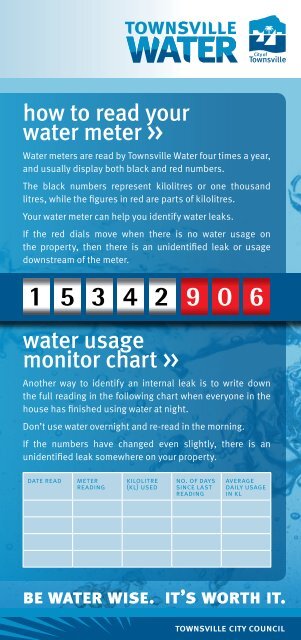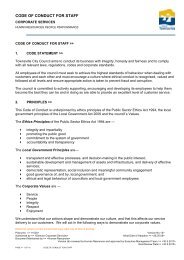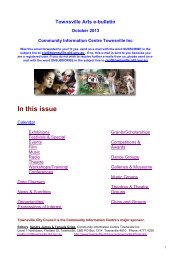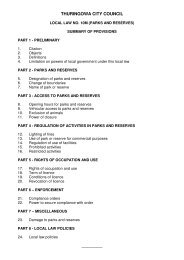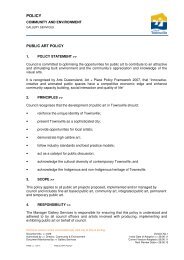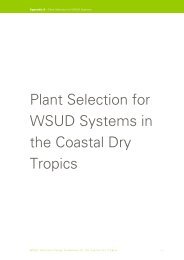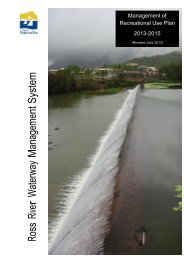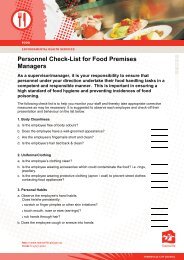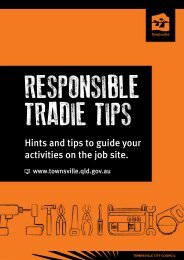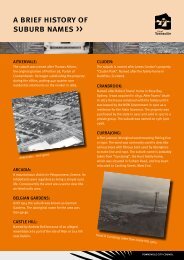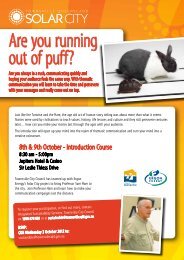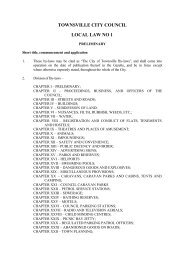how to read your water meter >> water usage monitor chart >>
how to read your water meter >> water usage monitor chart >>
how to read your water meter >> water usage monitor chart >>
Create successful ePaper yourself
Turn your PDF publications into a flip-book with our unique Google optimized e-Paper software.
<strong>how</strong> <strong>to</strong> <strong>read</strong> <strong>your</strong><br />
<strong>water</strong> <strong>meter</strong> >><br />
Water <strong>meter</strong>s are <strong>read</strong> by Townsville Water four times a year,<br />
and usually display both black and red numbers.<br />
The black numbers represent kilolitres or one thousand<br />
litres, while the figures in red are parts of kilolitres.<br />
Your <strong>water</strong> <strong>meter</strong> can help you identify <strong>water</strong> leaks.<br />
If the red dials move when there is no <strong>water</strong> <strong>usage</strong> on<br />
the property, then there is an unidentified leak or <strong>usage</strong><br />
downstream of the <strong>meter</strong>.<br />
<strong>water</strong> <strong>usage</strong><br />
moni<strong>to</strong>r <strong>chart</strong> >><br />
Another way <strong>to</strong> identify an internal leak is <strong>to</strong> write down<br />
the full <strong>read</strong>ing in the following <strong>chart</strong> when everyone in the<br />
house has finished using <strong>water</strong> at night.<br />
Don’t use <strong>water</strong> overnight and re-<strong>read</strong> in the morning.<br />
If the numbers have changed even slightly, there is an<br />
unidentified leak somewhere on <strong>your</strong> property.<br />
date <strong>read</strong><br />
<strong>meter</strong><br />
<strong>read</strong>ing<br />
kilolitre<br />
(kl) used<br />
no. of days<br />
since last<br />
<strong>read</strong>ing<br />
average<br />
daily <strong>usage</strong><br />
in kl<br />
be <strong>water</strong> wise. it’s worth it.
<strong>your</strong> <strong>water</strong> saving<br />
<strong>to</strong>ol-box for the garden >><br />
Did you know the average Townsville household uses<br />
around 60 per cent of its <strong>water</strong> on lawns and gardens<br />
By being <strong>water</strong> smart in the garden, you can make a big<br />
difference <strong>to</strong> <strong>your</strong> <strong>water</strong> <strong>usage</strong>.<br />
sprinklers >><br />
A garden sprinkler can use up <strong>to</strong> 1,000 litres per hour.<br />
Most lawns and gardens only need <strong>water</strong>ing once or twice<br />
a week. Au<strong>to</strong>mated irrigation systems work best in offering<br />
good control. However, depending on <strong>your</strong> <strong>water</strong> pressure<br />
and the type of outlets, you may still be using lots of <strong>water</strong>.<br />
Check <strong>your</strong> <strong>meter</strong> before and after using <strong>your</strong><br />
irrigation system <strong>to</strong> calculate <strong>how</strong> much is<br />
used per cycle.<br />
the right landscaping >><br />
Remember, right plant, right place! Shade<br />
loving plants in the sun will require excessive<br />
<strong>water</strong>ing. Native plants from <strong>your</strong> local area<br />
use much less <strong>water</strong> than exotic plants.<br />
<strong>your</strong> lawnmower >><br />
Raise the lawn mower blade <strong>to</strong> at least three<br />
inches – a lawn cut higher encourages grass<br />
roots <strong>to</strong> grow deeper, and is better at holding<br />
soil moisture.<br />
fertiliser >><br />
A slow-release fertiliser is best. Choose one<br />
that is low in nitrogen, as <strong>to</strong>o much nitrogen<br />
will increase the need for <strong>water</strong>.<br />
mulch >><br />
In the garden, mulch will reduce more than<br />
70 per cent of evaporation. You can also<br />
reduce lawn areas by using ground covers<br />
and mulches instead.<br />
for more information >><br />
07 4727 9000<br />
enquiries@<strong>to</strong>wnsville.qld.gov.au<br />
www.<strong>to</strong>wnsville.qld.gov.au<br />
be <strong>water</strong> wise. it’s worth it.


